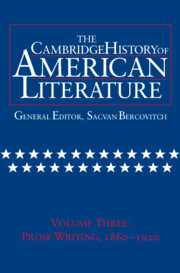Book contents
- Frontmatter
- Introduction
- THE AMERICAN LITERARY FIELD, 1860–1890
- LITERARY FORMS AND MASS CULTURE, 1870–1920
- PROMISES OF AMERICAN LIFE, 1880–1920
- 1 An American tragedy, or the promise of American life
- 2 The production of visibility
- 3 The contracted heart
- 4 Success
- BECOMING MULTICULTURAL: CULTURE, ECONOMY, AND THE NOVEL, 1860–1920
- Chronology 1860–1920
- Bibliography
- Index
4 - Success
from PROMISES OF AMERICAN LIFE, 1880–1920
Published online by Cambridge University Press: 28 March 2008
- Frontmatter
- Introduction
- THE AMERICAN LITERARY FIELD, 1860–1890
- LITERARY FORMS AND MASS CULTURE, 1870–1920
- PROMISES OF AMERICAN LIFE, 1880–1920
- 1 An American tragedy, or the promise of American life
- 2 The production of visibility
- 3 The contracted heart
- 4 Success
- BECOMING MULTICULTURAL: CULTURE, ECONOMY, AND THE NOVEL, 1860–1920
- Chronology 1860–1920
- Bibliography
- Index
Summary
FICTITIOUS DEALING
“What will she do?” is a question Henry James asks twice about Isabel Archer in his Preface to the New York Edition (1908) of The Portrait of a Lady (1881). The answer is marry, a conventional enough response for the heroine of a nineteenth-century novel, but one also that echoes inversely a concern of James's: “I shall not marry,” he wrote Grace Norton while he was writing and she was reading Portrait, and, several months earlier, enclosing a copy of the first chapters of Portrait, he wrote William Dean Howells, “The only important things that can happen to me are to die and to marry, and as yet I do neither.” What he was doing was writing; his letters of 1880 are filled with the sense of confidence and achievement that seem to have accompanied the production of Portrait. “I must try and seek a larger success than I have yet obtained in doing something on a larger scale than I have yet done,” he had written Howells the year before, and by the time he wrote Grace Norton announcing his intention never to marry, he was able also to characterize Portrait as “much the best thing I have done,” just the “success” he had been looking for. Thus the question of what Isabel will do arises as an answer to the question of what Henry will do, and The Portrait of a Lady, by answering the first question, becomes the answer to the second.
- Type
- Chapter
- Information
- The Cambridge History of American Literature , pp. 376 - 410Publisher: Cambridge University PressPrint publication year: 2005

